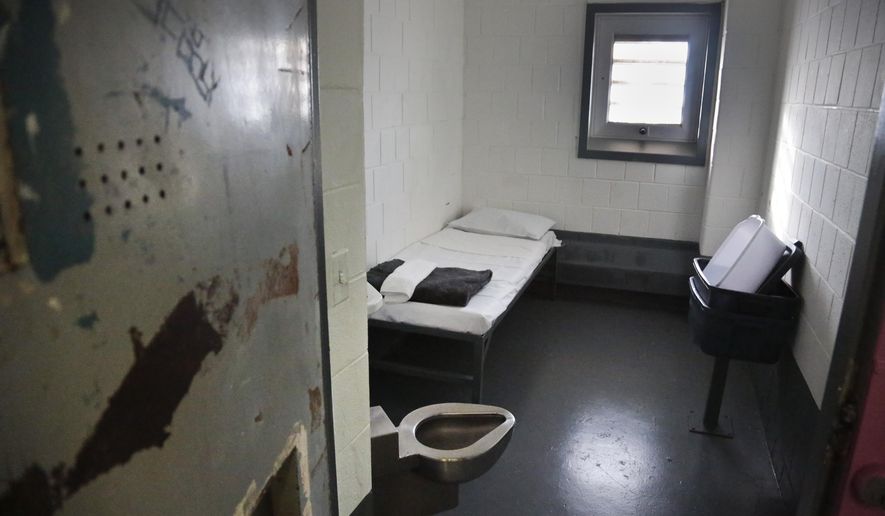As a criminal justice reform package to limit mandatory minimum sentences and thereby reduce prison populations has stalled in Congress, a group of Democratic lawmakers has put forth another proposal that they say would reduce incarceration rates: abolish the bail system.
Introduced Wednesday by Rep. Ted Lieu, the proposal would do away with using the payment of money as a condition of pretrial release in any federal criminal case and would discourage use of money bonds in state courts.
“Throughout the nation, those with money can buy their freedom while poor defendants stay behind bars awaiting trial,” the California Democrat said. “Further horrifying, many people decide to plead guilty purely to get out of jail because they cannot afford bail.”
Six in 10 adult inmates, or about 450,000 people, are held in custody while awaiting action on a criminal charge and haven’t been convicted, according to the Bureau of Justice Statistics. Some of those charged with serious or violent crimes would likely still be held in custody ahead of their trials, but lawmakers say the legislation would enable those charged with less-serious crimes to be released under supervision conditions that ultimately would cost taxpayers less money.
Mr. Lieu’s legislation estimates that the pretrial detention of inmates at the state and local level costs $14 billion every year.
To discourage the use of bonds in state courts, the legislation proposes banning the distribution of the Justice Department’s Edward Byrne Memorial Justice Assistance Grants to local law enforcement agencies that continue the practice. More than $255 million was available to law enforcement agencies through the grants in fiscal 2015.
The legislation does not propose regulations for determining who should be held in pretrial detention and who should be set free, but in court systems that have eliminated cash bonds, the decision is often based on factors such as whether the person poses a danger to the community or a flight risk.
“It is unconscionable that hundreds of thousands of Americans who haven’t been convicted of a crime and don’t present a threat to public safety are stuck in jail awaiting their trials because they can’t afford bail,” said Rep. Ruben Gallego, Arizona Democrat and co-sponsor of the bill. “A supervised release system would save money, reduce jail populations, and ensure that low-income individuals are able to maintain their employment and aren’t roped into bad plea deals.”
Stories abound of individuals charged with nonviolent offenses who are held in jail for months, sometimes even years, awaiting trial simply because they can’t afford to pay bond.
Rebecca Snow might have been one of those who languished in jail after her arrest last year. Police said Ms. Snow was arrested at a Wal-Mart in Gonzalez, Louisiana, after she was caught shoplifting. She faced two misdemeanors — theft and trespassing. In accordance with the policy of the Ascension Parish Sheriff’s Office, the 33-year-old would not be released from jail ahead of trial unless she paid a $579 bond. Without a job or steady income, and relying on Medicare and food stamps, the indigent mother of two was unable to pay.
Ms. Snow would have remained in jail until she went to trial or pleaded guilty — an outcome civil rights advocates say occurs more frequently among those who are unable to pay their bail and remain in jail pending trial.
Instead, the Roderick and Solange MacArthur Justice Center in New Orleans filed a lawsuit on behalf of Ms. Snow and other indigent inmates challenging the offense-based bail schedule that was used to calculate how much they were required to pay for their release. Ascension Parish settled the lawsuit within weeks, agreeing that no defendant would be held in Ascension Parish Prison on a monetary bail that the person couldn’t afford.
Bail reform has received some attention in recent months as lawmakers have discussed efforts to reform the criminal justice system. Other high-profile incidents, including the death of Sandra Bland in June inside a Texas jail cell after she was unable to pay a $500 bond, also have drawn attention to the issue.
It’s unclear whether Mr. Lieu’s legislation will be able to gain traction: The bill has no Republican co-sponsors. However, the Justice Department has shown willingness to engage on the issue.
Last year, the Justice Department filed a rare statement of interest in a lawsuit that challenged the fixed-bail system of Clanton, Alabama, arguing that “any bail or bond scheme that mandates payment of prefixed amounts for different offenses in order to gain pretrial release, without any regard for indigence, not only violates the 14th Amendment’s Equal Protection Clause, but also constitutes bad public policy.” The city settled the lawsuit and agreed to release most misdemeanor defendants immediately, without requiring them to post bail.
• Andrea Noble can be reached at anoble@washingtontimes.com.




Please read our comment policy before commenting.